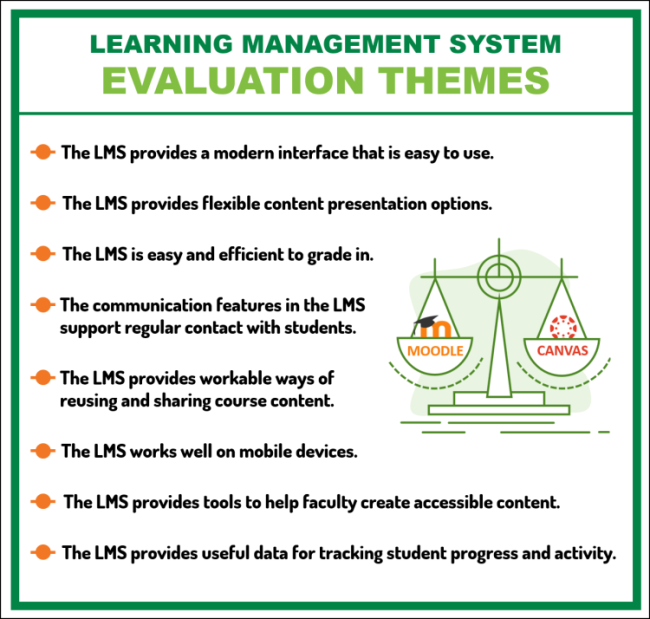The Evaluations Have Begun: Reporting Out on The LMS Task Force’s Work
In our very first blog post, Why Durham Tech is Evaluating Alternatives to Sakai, and What to Expect, we shared that a Learning Management System Evaluation (LMS) Task Force had been formed at Durham Tech and that its charge is to carefully review Moodle and Canvas to determine which of these two learning management systems will best meet the needs of Durham Tech’s students and faculty. Over the past few weeks, the LMS Task Force began its work by first deciding upon the evaluation measures it would use to investigate each system. In this post, we’ll share the Task Force’s evaluation themes with you, as well as its initial thoughts on Moodle and Canvas after experiencing a demonstration of each system.
Selecting LMS Evaluation Themes
The LMS Task Force determined that there are eight broad themes that are central to how Durham Tech students and faculty use a learning management system. In discussing these themes, the Task Force was in consensus about the importance of faculty being able to easily create content in the learning management system, as well as being able to easily administer a class site throughout the semester. Additionally, —and equally important—the Task Force recognized that students need to feel comfortable navigating their classes in the learning management system, to reduce their cognitive load and increase the potential for more engagement with learning content.
The eight evaluation themes in the image below represent the lens by which the LMS Task Force is evaluating Moodle and Canvas.
The Instructional Technologies Team also has a much longer list of technical and administrative items that it will consider as part of the LMS evaluation process, as well. It includes specific items such as the ability to: integrate with Durham Tech's current systems, integrate with publisher content, provide academic administrators access to courses they oversee, combine multiple sections into a single site, and much more.
Initial Thoughts on Moodle and Canvas
After reaching a consensus on the evaluation themes, the LMS Task Force met on two consecutive days mid-October to learn more about the features and capabilities of Moodle and Canvas by watching a demonstration of each product. Each member then shared their initial impressions of each product through survey. The Distance Learning Committee was also invited to watch the demonstrations and provide their feedback.
Early thoughts on Moodle and Canvas are that Moodle appears to have many options for delivering content, but it also seems to have a steep learning curve in order to implement those features. In contrast, Canvas appears to be more streamlined, straightforward, and easier to use, with less of a learning curve.
Continuing the Evaluation
Seeing a demonstration of each learning management system is one piece of the puzzle. The Task Force was also provided with “sandbox” access to Moodle and Canvas to allow them to “test drive” each LMS. Task Force members attempting to complete common instructor tasks in each system, such as posting an announcement, posting a syllabus, setting up weekly content, etc. This exercise allowed them to gain some hands-on experience in each system to evaluate ease-of-use, as well as the quality of support documentation provided by the vendors.
As the Task Force continues its evaluation and discussions, Instructional Technologies is reaching out to several of our sister colleges in the North Carolina Community College System to report back on their experiences using and administering Moodle or Canvas:
- Selected colleges that use Moodle (OpenLMS)
- Alamance Community College
- Davidson-Davie Community College
- Selected colleges that use Canvas
- Guilford Technical Community College
- South Piedmont Community College
Additionally, Instructional Technologies is exploring content migration options and will speak with the University of North Carolina at Chapel Hill to learn more about their current experience migrating from Sakai to Canvas, and we will be exploring content migration options.
In Our Next Blog Post
There’s still lots to share with you, so keep an eye out for our next blog article coming very soon (are you subscribed, yet?).
Remember to subscribe to the Instructional Technologies blog by entering your email address in the box on the right and clicking subscribe! We want to make sure you’re notified each time a new article is posted.


